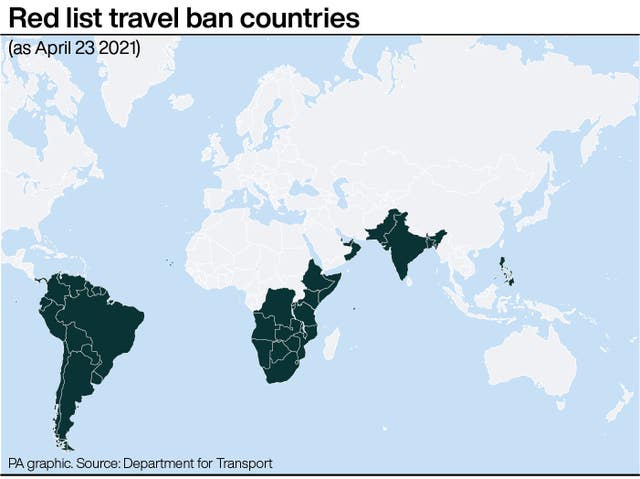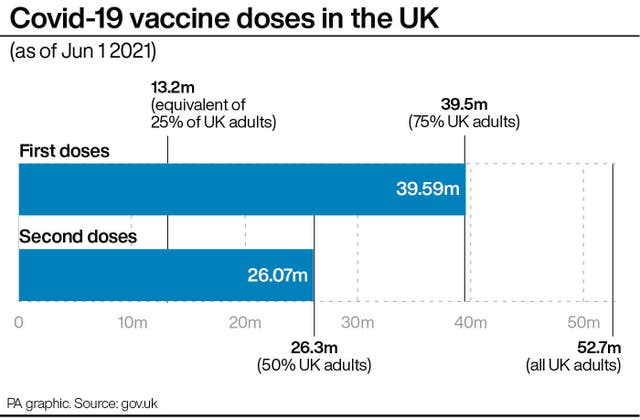Travel list changes expected as holidaymakers await to see impact of variants
Boris Johnson has said the Government will have “no hesitation” about downgrading countries to the amber or red list if necessary

Holidaymakers are bracing themselves for changes to the Government’s travel list, amid concerns over the impact of Covid-19 variants on summer plans.
Ministers are predicted to update the traffic light destination system on Thursday, which could see countries moving between the green, amber and red lists.
On Wednesday, Boris Johnson warned the Government will have “no hesitation” over moving countries off the green list if necessary, and said it will “wait and see” what the recommendations of the Joint Biosecurity Centre are before announcing changes to the travel lists.
People returning to the UK from green locations are not required to self-isolate, and only need to take one post-arrival coronavirus test.

The Prime Minister said: “We are going to try and allow people to travel as I know many people want to, but we’ve got to be cautious.
“We’ve got to continue to put countries on the red list, on the amber list, when that is necessary.
“We will have no hesitation in moving countries from the green list to the amber list to the red list if we have to do so.
“The priority is to continue the vaccine rollout to protect the people of this country.”
Debate is continuing over whether the final stages of unlocking restrictions in England can go ahead on June 21, due to concerns over the spread of the coronavirus variant first identified in India.
The Daily Mail reported ministers also have been alerted to a variant first thought to have originated in Nepal, suggesting this could have an impact on holidays.
Ahead of any announcements, one industry expert said several Greek islands, Malta and parts of the Caribbean could be added to the green travel list on Thursday.
Paul Charles, chief executive of travel consultancy The PC Agency, said a number of popular holiday destinations “really deserve” to be moved to the low-risk tier.
Mr Charles told the PA news agency he expects additions to the list to include the Greek islands of Zante, Rhodes and Kos, the Caribbean islands of Grenada and Antigua, plus Malta and Finland.

Assessments are based on a range of factors, including the proportion of a population that has been vaccinated, rates of infection, emerging new variants, and access to reliable scientific data and genomic sequencing.
Portugal is the only viable major tourist destination currently on the green list, but there have been reports that it could be downgraded in the future.
Mr Charles said he would be “surprised” if Spain’s Balearic Islands – including Ibiza, Majorca and Menorca – are added in Thursday’s update.
“They’re hugely popular and I’m not sure the Government is ready to encourage so much travel at the moment.”
The vaccination programme is seen as key in the bid to reopen the country and beyond.

The UK could hit another major milestone on Thursday, passing the point of half of all UK adults receiving both doses of a coronavirus vaccine.
Latest figures suggest 49.5% of the UK population aged 18 and over have had two jabs.
Government figures, based on people who died within 28 days of testing positive for Covid-19, said a further 12 people had died within 28 days of testing positive for Covid-19 as of Wednesday, bringing the UK total to 127,794.
The Government also said that, as of 9am on Wednesday, there had been a further 4,330 lab-confirmed cases in the UK.
Vaccines minister Nadhim Zahawi, pressed about the dropping of domestic restrictions on June 21, told ITV’s Peston: “At the moment there’s nothing in the data to suggest that we need to move the road map.
“We’ve been straight with people, as both the Prime Minister and the Health Secretary have said, on June 14 we will share with the nation all the data that we’d have gathered.
“The next 12 days are going to be really important to see what the virus is doing. We’ve got a very large-scale surveillance infrastructure in place in terms of waste water surveillance and large-scale testing.”
Elsewhere, health ministers from the G7 nations will meet in Oxford on Thursday in a bid to reach agreement to help reduce the risk of global pandemics and emerging health threats.
They are expected to agree to share information on how to detect such threats and the causes.





